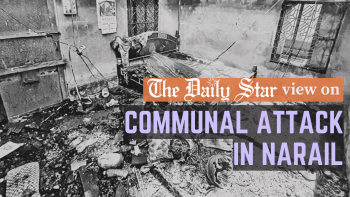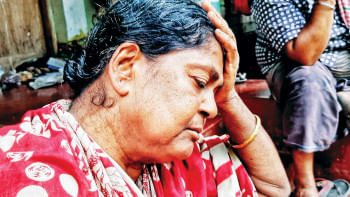Who is entitled to 'hurt religious sentiments'?

Here's a conundrum no one wants to solve: When someone is accused of "hurting religious sentiments" in a post on Facebook, law enforcers show incredible alacrity in arresting the individual – within hours they are "caught" and taken into custody. But when hooligans attack the homes and places of worship of minority communities, vandalising, burning, looting and sometimes assaulting the community members, law enforcers are either nowhere to be seen, or are nearby but not doing anything to stop the mobs until most of the damage is done.
It begs the question: Are these attackers supernatural beings whose faces cannot be identified, and who disappear into thin air as soon as their deeds are done? Do they have invisibility cloaks when law enforcers are around?
This brings us to a second conundrum: Apparently, only the majoritarian population experience hurt sentiments – minority communities have no sentiments to be hurt. Also, they should not feel fear or insecurity just because their homes, shops and temples are attacked – the government will investigate and rebuild their homes in no time, and all will be forgotten.
These two puzzles have been cropping up with increased frequency these days. On Friday, mobs attacked a neighbourhood in Narail over a Facebook post allegedly by a college student who "hurt their religious sentiments." The attackers burnt and destroyed homes and shops of the Hindu community; the victims recognised some of them as residents from nearby villages. Witnesses said the attacks took place in front of the police. No one filed a case regarding the attacks in fear – the attackers were seen roaming around the area with the police (The Daily Star, July 18 , 2022). The college student was promptly arrested and placed on remand. Five people have been arrested as suspects in the attack, though police have not revealed their names. Can the victims of this attack, which seems to be purely driven by bigotry, expect any justice when their attackers are chummy with law enforcers?

It is an eerie repetition of the attacks in Ramu, Cox's Bazar in September 2012, when zealots vandalised and burnt 12 pagodas and more than 50 homes over a Facebook post by a Buddhist youth, leaving the Buddhist community shell-shocked and terrified for their lives. The next day, another mob attacked five Buddhist temples in Ukhiya and vandalised two Hindu temples; they also burnt down Buddhist homes in Teknaf. At that time, those who had committed the heinous acts were seen with officials who had visited to show sympathy to the victims. The Facebook post turned out to be fake; somebody had framed the young man in order to ignite the assaults. So, did the victims get justice? A number of criminal cases and two writ petitions by two Supreme Court lawyers against the perpetrators and against officials who were negligent in preventing the crimes were filed. Probe reports identified the attackers and found officials negligent in preventing the crimes. But nearly a decade after the event, justice remains elusive.
Since the Ramu attack, many more such crimes have been committed in the name of religion, terrorising communities and leaving them insecure and disillusioned. Is this the country that was born from a movement against sectarianism, discrimination, and the oppression of a people by a fascist government? Is this the nation that emerged with the supreme sacrifice of people from all faiths? What happened to the spirit of liberation – the egalitarian, inclusive society dreamt of by the father of the nation and our freedom fighters?
These ideals sound naive and hollow in the present reality. We are now confronted with an attempt to impose a narrow, communal definition of identity that immediately labels anyone with differing views or ideology as "outsiders." As this is the definition of religion and identity, which is endorsed by the majority, it puts the minority populations – which include people of faiths other than Islam as well as anyone with an ideology different from a particular interpretation of Islam – in a vulnerable and unsure position. Meanwhile the majority, enjoying the power of numbers, feels emboldened further by the tacit indulgence of the administration and even the state. So much so that they have a sense of impunity when they lash out at the weaker groups at the slightest provocation or even by faking this provocation.
Which brings us back to whose religious sentiments are more important to address: The ones who are offended by an unverified social media post or the communities whose houses and temples are attacked and destroyed? Given how the administration responds, it is apparent that the first group gets preference, and this bias determines how the legal system will deal with the incidents. The government, while successful in catching militant groups and countering terrorist attacks in the conventional sense, has not been very active in curbing the radical views of an ultra-conservative interpretation of faith. The hate speeches spewed out at religious sermons go on unabated at mosques, YouTube and social media. Whatever attempts have been made to stop some of the proponents of this bigotry have been too little, too late. Whether it is to appease certain groups as an electoral strategy or to keep them from acquiring political ambitions of their own, such concessions are inevitably dangerous for not just those outside these groups, but for the government itself.
What's most disturbing is that this bigotry has seeped into the administration, as evidenced by the inaction of police in many of these cases. While the person accused of this vague idea of hurting religious sentiment will be tried under a non-bailable law – the Digital Security Act (DSA) – the perpetrators of terror, if they are arrested, are out on bail.
The Narail incident and those that have occurred only weeks before, with Hindu teachers being targeted in various ways, point to the rot that is spreading throughout Bangladesh, manifesting its ugliness with greater regularity. Is this the kind of society we want to build – one that fails to protect its citizens from particular communities, while giving licence to those who create mayhem, insecurity, and division in the name of religion? If the state wants to retain its credibility as one that upholds the rights of all religious communities, it must first hold these hatemongers accountable and bring them to book. It must also realise the absurdity of having a law that metes out disproportionate punishment for the vague and debatable notion of hurting religious sentiment – and that, too, of only a certain group.
Aasha Mehreen Amin is joint editor at The Daily Star.

 For all latest news, follow The Daily Star's Google News channel.
For all latest news, follow The Daily Star's Google News channel. 











Comments